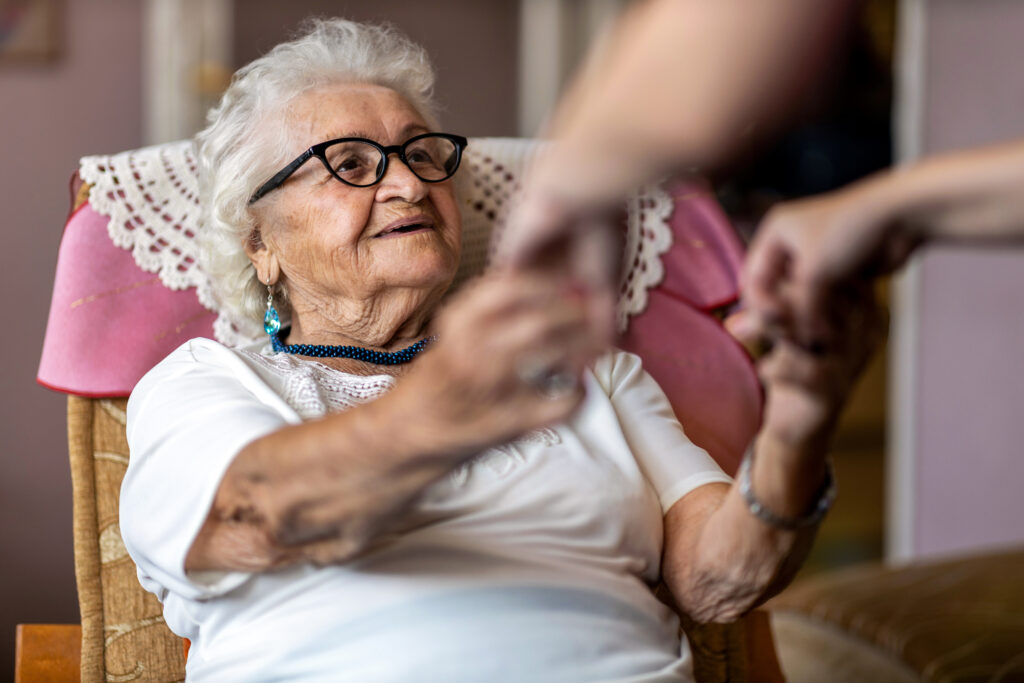Home Care in California: Common Terms, How to pay for Home Care, Licensing and Questions to ask
California is a sought-after destination for seniors and retirees. Notably, the climate attracts people from across the country who wish to enjoy year-round sunshine and a laid-back lifestyle, offering many great options for home care in California. In fact, there are over 40 million people in California, and individuals aged 65 years and older make up about 16% of this population. As the number of aging adults continues to rise, it is likely that many will require care at some point. Most of the time, when people think of senior care, the first thing they envision is a nursing home. However, nursing homes are not the only choice available for individuals seeking care for themselves or their loved ones.
In reality, many different types and levels of care exist for our population of people aged 65 and older. Typically, seniors prefer to age in place for as long as possible rather than move into a senior living community. Nevertheless, the challenges of aging may make living at home increasingly difficult. Thus, the focus of home care (in-home care in California) is to keep people healthy and safe.
Furthermore, due to the size of California and its large population, the state hosts numerous agencies that provide care for seniors. Consequently, California in-home care is available in a vast number of cities throughout the state, including Los Angeles, Sacramento, San Jose, San Diego, San Francisco, Santa Barbara, Santa Cruz, Anaheim, and many others.

- Home Care in California: Common Terms, How to pay for Home Care, Licensing and Questions to ask
- What is home care in California?
- How do you know it may be time for Home Care?
- What Assistance do In-Home Care Aides Provide?
- What are the different In home care options?
- Laws and regulations in California
- How much does in home care cost in the state of California?
- Questions and inquiries about home care
- Resources and Links- California
- Search other areas for Home Care
What is home care in California?
Home care in California is commonly referred to as “in-home care.” Specifically, in-home care is well-suited for seniors who may only require some basic assistance at home. Additionally, caregivers can customize care plans for each individual based on their unique needs. Moreover, home care may serve as an excellent option for family members who must leave town or simply need a break from caring for their loved one. In this regard, home care aides bring a sense of personalization by providing companionship, socialization, and a vital sense of connection. Furthermore, the home aides may assist with activities of daily living (ADLs), which include offering medication reminders and providing assistance with bathing and eating. Thus, in-home care plays a crucial role in supporting seniors’ well-being and independence.
Home care and aging in place
In home care services include assistance with activities of daily living (ADLs). These in-home aides may assist with personal care and monitoring like they would receive in a long-term care community. All while they remain in the comfort of their own home.

How do you know it may be time for Home Care?
What are the signs to look for?
Is your loved one forgetting things more frequently? Typically, people forget things from time to time; however, if you notice that they are forgetting simple tasks they normally perform regularly, this may be a sign that they need assistance.
Furthermore, have you noticed that your loved one is spending less and less time managing their hygiene or personal appearance? For instance, they may stop brushing their teeth or allow their facial hair to grow in an unkempt fashion, especially if they did not do so before. Additionally, are they going for longer periods in the same clothing or neglecting their regularly scheduled eating habits? Grooming and hygiene fall under the umbrella of activities of daily living (ADLs), and as such, a personal care assistant may help with these important tasks.
Moreover, it is not uncommon for elderly adults to experience trouble walking, getting up from a seated position, or needing help getting in and out of bed. Signs like these can indeed be dangerous because the risk of a fall increases as mobility declines. In this case, the support of a home care caregiver can assist them with moving around the house safely.
Lastly, did you notice that your loved one’s home is in disarray? If they usually show signs of tidiness or regular cleanliness but now the home appears disheveled and dirty, this could indicate a problem. In-home aides can assist with normal household maintenance tasks, such as dusting, sweeping, cleaning the kitchen, or doing laundry, to help bring order back to their living space.
What Assistance do In-Home Care Aides Provide?
In home Care Aides in California provide a variety of services and assistance. Depending on the individuals condition, elderly adults may require different types of care.
Services included in home care:
- Companionship
- Socialization
- Cognitive stimulation
- Medication reminders
- Grocery shopping
- Transportation
- Respite for family caregivers

Oftentimes, people think of nursing homes or retirement homes as the only options for senior care. However, as we’ve discussed earlier, there are multiple care alternatives available. Moreover, even within in-home care, various levels of support exist that are specifically suited to meet individuals’ needs.
In fact, California in-home care may offer a variety of services depending on the agency you choose. Therefore, it’s essential to explore these options to find the most appropriate care for your loved ones.
What are the different In home care options?
The various care services and options
Personal Care Assistant
- Companionship as well as assistance with activities of daily living, (non-medical personal care) toileting, dressing, grooming, and bathing.
- They can help with grocery shopping and meal preparation.
- A personal care assistant can help with family difficulties. If a family caregiver must leave town or be away from the home overnight the caretaker can stay with the individual and monitor and assist as needed.
- If a spouse is too heavy, a personal assistant can be a great asset in helping the individual move without risk of injury.
- These care assistants cannot perform any medical care.
Companion Care
- These companions spend time with older adults. Providing companionship is especially relevant for people who live alone, or do not leave the house due to cognitive impairments or frailty.
- These companions are there to look after the person, keep a watchful eye, act as an extension of the person to help with mobility and general physic functions.
- They may drive the person to appointments, prepare light meals and snacks. They may even play games or read and listen to music together.
- Companion care is a great way to bring social interaction and assistance to a person who may otherwise spend long periods of time alone.
Home Health Care
- Home health is the only type of home care associated with skilled nursing or any therapy services.
- This type of care is of a much higher-level medical care and therapy.
- Home health aides must have a nursing degree or certification or go through specialized training.
Laws and regulations in California
Licensing
The primary objective of in-home care is to provide individuals in need of assistance with the highest quality services possible. In order to ensure that agencies adhere to the highest standards, all in-home care agencies must be licensed and regulated by The Department of Social Services’ Home Care Service Bureau.
Grievances
Furthermore, all agencies should have a clear plan in place for families to voice any grievances or complaints. It is important to note that the person receiving care has extensive rights pertaining to the services provided.
Specifically, the individual under care has the right to file a complaint with the agency regarding the following issues:
- Their treatment and the care provided.
- The agency’s failure to deliver certain necessary care.
- Any lack of respect for their property and/or person.
Additionally, individuals have the right to participate in discussions about their care, be informed about their treatment options, and consent to or refuse care in advance of and during treatment. Thus, these rights empower individuals and ensure they receive the care they deserve.
How much does in home care cost in the state of California?

In home care in California typically costs $6,110 per month. This rate is about $1,000 more than the national average for in home care. On average, California is the most expensive state in the region for in home care.
- California: $6,110 per month
- Oregon: $6,010
- Nevada: $5,200
- Arizona: $5,550
The cost of in home care varies drastically depending on where you live within California. Some regions and cities may costs thousands of dollars more per month than other cities.
- Santa Cruz: $6,900 per month
- Sacramento: $6,300
- Chico: $5,750
- San Luis Obispo: $7,200
In home care in California is more expensive than assisted living ($5,250) but far less expensive than a nursing home (nearly $10,000).
Questions and inquiries about home care
Agency Information
- Is the agency RN operated?
- Is the agency a franchise or locally owned and operated?
- Is the agency licensed by WA State Department of Health?
- Is the agency licensed for both home care and home health?
- Does the agency have liability insurance?
- Can the agency respond to you 24/7?
Caregiver Information
- Are employees licensed, bonded & insured? Or are they independent contractors?
- Does the agency test skills, conduct behavioral interviews and verify caregiver credentials?
- Are caregivers required to have current certifications for First Aid, CPR, and TB?
- Are caregivers provided continuing education/training?
- Can authorized individuals monitor care and make requests online in real time?
- Does the agency offer caregiver replacement when the “fit” may not be right?
Documentation and Supervision
- Does an RN/MSW/Care Manager conduct a free home care assessment?
- Does an RN/MSW/Care Manager create a home care plan?
- Does an RN/MSW/Care Manager supervise the caregivers?
- Do caregivers receive client orientation before arriving at a client’s home?
Policies and Cost
- Can services be cancelled with a 4-hour notification?
- Does the agency offer flexible scheduling, custom care plans, and a continuum of care?
- Does the agency have weekly or monthly minimums?
- What is the hourly minimum per shift?
- Does the agency offer home care discounts?
- What is the required deposit?
- Will the agency accept long-term care insurance?
Resources and Links- California
Area Agencies on Aging The California Department of Aging (CDA) administers programs that serve older adults, adults with disabilities, family caregivers, and residents in long-term care facilities throughout the State. These services are provided locally by contracted agencies. This webpage is intended for those who provide, or seek to provide a variety of aging services.
The Home Care Services Bureau is responsible for licensing Home Care Organizations including processing applications, receiving and responding to complaints and conducting unannounced visits to ensure compliance.
California Department of Aging Under the umbrella of the California Health and Human Services Agency, the California Department of Aging (CDA) administers programs that serve older adults, adults with disabilities, family caregivers, and residents in long-term care facilities throughout the State. These programs are funded through the federal Older Americans Act, the Older Californians Act, and through the Medi-Cal program.
California Rural Indian Health Board The Pit River Tribe of California’s Rancherias in the operating area are as follows: * Montgomery Creek Rancheria * Roaring Creek Rancheria * Burney * Lookout Rancheria * XL Ranch Rancheria * Likely Rancheria * Big Bend Rancheria The main site, Burney Indian Health Clinic, in Burney, CA offers full time health care in many fields. As a service to the community the Shasta County W.I.C. Program is also located at the site in Burney. A satellite office, the XL Ranch Reservation Clinic, is located in Alturas, CA (Modoc County) providing referral and outreach services. The principal referral facility is Mercy Medical Center Hospital in Redding, CA which approximately miles from the main clinic site. This facility offers general medicine with 169 medical/surgical, 14 ICU, 14 CCU, 19 Pedriatrics, 29 Perinatal, 5 Acute/Respiratory and 6 ICCN beds
Eldercare Locator This is a great resource to search for specific care in specific counties and cities. This database is a nationwide resource that connects older Americans and their caregivers with trustworthy local support resources. Connect with services such as meals, home care or transportation, or a caregiver education or respite from caregiving responsibilities. The Eldercare Locator is a public service of the Administration on Aging (AoA), an agency of the U.S. Administration for Community Living.
Medicare provides a search feature to find & compare providers near you, most senior housing and care providers are included on CareAvailability.com. Find & compare plans in your area. Determine if you qualify for premium savings
Medicaid offers information on how to apply for Medicaid, eligibility criteria, links to local state offices, and additional resources.
The Alzheimer’s Association is the leading voluntary health organization in Alzheimer’s care, support and research. Whether you are living with Alzheimer’s or caring for someone with the disease, information and resources are available.
Area Agencies on Aging The California Department of Aging (CDA) administers programs that serve older adults, adults with disabilities, family caregivers, and residents in long-term care facilities throughout the State. These services are provided locally by contracted agencies. This webpage is intended for those who provide, or seek to provide a variety of aging services.
The Home Care Services Bureau is responsible for licensing Home Care Organizations including processing applications, receiving and responding to complaints and conducting unannounced visits to ensure compliance.
Search other areas for Home Care
Not finding what you’re looking for? Take a look below.
